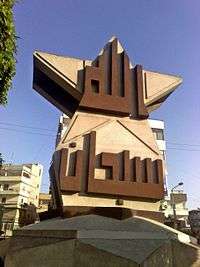Subhan Allah

| Part of a series on |
| God in Islam |
|---|
 |
|
Subḥān Allāh (Arabic: سبحان الله) is an Arabic phrase, meaning "Glory be to God".
Interpretation
The phrase literally means "Praised be God" or "Glory (be) to God".
The phrase often has the connotation of praising God for His total perfection, implying a rejection of any anthropomorphic elements or associations with God, or any attribution of mistakes or faults to Him. Thus, it serves as testimony to God's transcendence (تنزيه, tanziyh).[1]
For example, the Quran says "SubhanAllahi ammaa yasifoon"[2] ("Glory be to God [who is free from] that which they describe") and "SubhanAllah ammaa yushrikoon"[3] ("Glory be to God [who is free from] that which they associate with him").
The phrase is mentioned in the hadith Sahih Bukhari, VBN 5, 57, 50.[4]
There is no exact counterpart for this phrase in the English language, so all the above meanings combined hold the meaning of that word.[5]
Usage
It is also often cited during the Islamic prayer (salat), or during the sermon (khutba) in the mosque.
Qul hāḏihi sabīl-ī ʾadʿū ʾilā l-lāhi ʿalā baṣīratin ʾanā wa-mani ttabaʿa-nī wa-subḥāna llāhi wa-mā ʾanā mina l-mušrikīna[6] (قُلْ هَـذِهِ سَبِيلِي أَ دْعُو إِلَى اللّهِ عَلَى بَصِيرَةٍ أَنَاْ وَمَنِ اتَّبَعَنِي وَسُبْحَانَ اللّهِ وَمَا أَنَاْ مِنَ الْمُشْرِكِينَ) This is my path and way. Those who follow Islam and I preach about Islam and invite everyone to Islam and to worship Allah as the Only God with wisdom, intuition and insight. And Subhan Allah (exalted is He, He is truly totally perfect, and I distance Him from all faults, human attributions and mistakes); and I am not of those who associate others with Him.)[7]
Muslims are also encouraged to say Subhan'Allah 33 times after prayer and throughout the day. The prophet taught that it is one of the four praises that Allah likes Muslims to say continuously.
See also
- Al-hamdu lillahi rabbil 'alamin
- Alhamdulillah
- Dhikr
- Hallelujah (הַלְּלוּיָהּ), Biblical word
- List of Islamic terms in Arabic
Notes
References
- ↑ al-Razi in his Mukhtar al-Sihah
- ↑ 37:159
- ↑ 52:43
- ↑ Sahih Bukhari. "Sahih Bukhari : Book of "The Companions"". sahih-bukhari.com.
- ↑ "معنى كلمة التسبيح " سبحان الله وبحمده " - islamqa.info". islamqa.info.
- ↑ Quran 12:108
- ↑ "الكتب - تفسير القرآن العظيم - تفسير سورة يوسف - تفسير قوله تعالى " قل هذه سبيلي أدعو إلى الله على بصيرة أنا ومن اتبعني "- الجزء رقم4". library.islamweb.net.